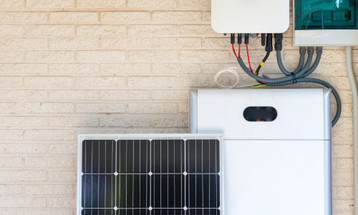Sep 20th 2023
The Role of Batteries in Photovoltaic Systems
A solar panel system has many components, from the panels to the inverter and the batteries. What role do batteries play in photovoltaic systems? Learn everything you need to know about solar system batteries for homes!
What a Solar Battery Does
We’re all familiar with electrical batteries for appliances and electronics, and a solar battery isn’t much different—it stores power for a solar energy system.
The role of batteries in photovoltaic systems is to store the excess electricity generated by the panels for the homeowners to use at night, during power outages, or on cloudy days with limited sunlight. On a sunny day, the panels generate more than enough electricity for your home, so the batteries allow the system to store the excess energy for a rainy day.
Types of Batteries
There are two types of solar batteries for homes: lead-acid and lithium-ion. If you’ve ever seen a car battery, you’ve likely seen a lead-acid battery. They’ve been around for years and are the cheapest options. Although, they’re becoming less common with the rise of lithium-ion units.
Lithium-ion batteries offer the best value because they last a long time, can hold more energy, and are significantly lighter than their lead-acid counterparts. Lithium-ion batteries cost more upfront, but considering long-term value, there’s little competition.
AC vs. DC-Coupled Storage
Another choice that solar panel homeowners will need to make regarding their batteries is whether they want AC or DC-coupled storage. Coupled storage refers to how the batteries connect to the solar energy system, as the cells create DC (direct current) electricity that must be inverted to AC (alternating current) for home use. Keep in mind that batteries can only store DC electricity.
DC-Coupled Storage
A DC-coupled storage system means the DC electricity flows from the panels through a charge controller and into the battery without inversion. The DC electricity converts to AC when it goes to the home for use. DC-coupled storage is more common and efficient and only needs to be inverted once. Still, it requires a complex installation.
AC-Coupled Storage
AC-coupled storage is when the DC electricity from the solar panels is inverted three times—when it goes to the house from the panels, from the house to the battery (excess electricity), and from battery storage back to the house. Each inversion means a power efficiency loss, but AC storage can hold energy from solar panels and the grid, making it common for retrofit installations of old panels.
Where To Get Labels for Your Solar Batteries and System
Whatever type of solar system and battery you currently use, you’ll need labels to meet electrical safety compliance. Get Solar Labels has all the solar tags and placards your home’s solar system needs for safety and convenience. Browse our site to find solar labels for your home today!

